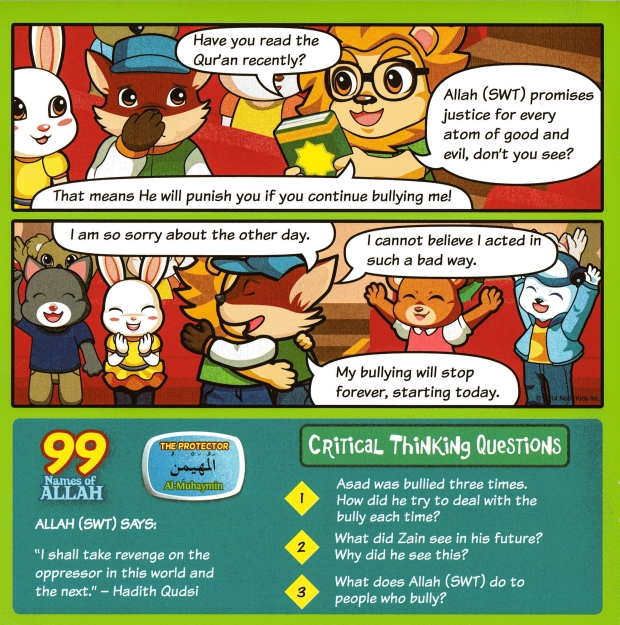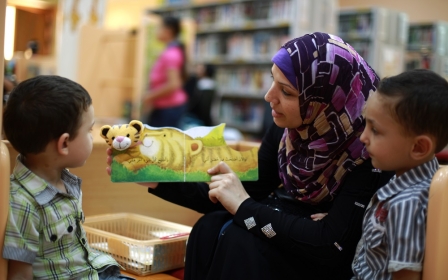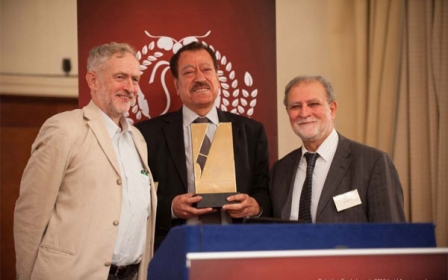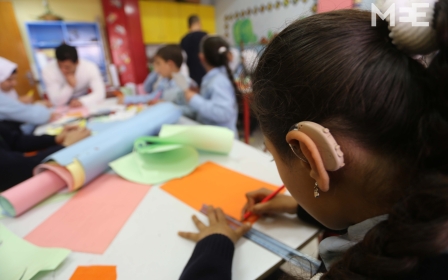Writing books for Muslim youngsters is not child’s play
NEW YORK, United States - Business is going well for Amin Aaser. The 27-year-old found a gap in the market for children’s picture books that teach young Muslim Americans to be proud of their faith despite a hostility towards Islam that has echoed across the United States since the 9/11 attacks.
His illustrated series, Noor Kids, describes itself as “a light for little Muslims” and has proven a hit among 25,000 families in the US and a growing number of young bookworms in Turkey, Australia, South Africa and the oil-rich Gulf, he said.
Although he promotes religious values, Aaser should be cautious – writing about Islam for youngsters is not child’s play. In the Middle East, controversies have seen authors blasted by clerics and threatened by others.
“We are very serious about this,” Aaser told Middle East Eye.
“On our team, we have two scholars who represent the breadth of diversity within Islam. When we put interpretations or critical thinking questions in our books, we have a conversation to ensure that it’s appropriate.”
Of course, Aaser did not create his picture books in 2011 to start wrangles with clerics over interpretations of the Hadith – the recorded traditions, sayings and teachings of the Prophet Muhammad.
Instead, he was motivated by his childhood. He was raised by Pakistani-Somali parents in Minneapolis, a mostly white and Christian northern city where preacher Billy Graham founded his evangelical group.
“I was ashamed of my identity and being Muslim,” Aaser said.
“During Ramadan I wouldn’t tell my friends I was fasting because I didn’t want anybody to know I was Muslim. I’d go out of my way so people never saw my mom, because I didn’t want anyone to see she had a headscarf.”
Aaser’s experience growing up Muslim in the US runs parallel to a series of experiments on racism in children in the 1930s and 1940s, he said.
In the tests, black toddlers were sat down with two dolls – one black and one white – and asked to identify which was “pretty,” “good,” “ugly” or “bad”. The young respondents typically associated their own skin tone with vice. The study has been repeated more recently; the results hold.
The same goes for Muslim Americans, said Aaser.
“It’s the setting you grow up in,” he said.
“Every time that you watch TV, go see a movie or listen to music – the picture that is presented is a negative one.”
Noor Kids seeks to challenge these prejudices, albeit in a child-friendly way.
Set in the fictional town of Maple Grove, Amira, a rabbit, attends school with Amin (a panda), Shireen (a bear) and Asad (a lion). The books weave together morality tales about bullying, charity and patience with titbits of Arabic and Islamic history.
Some books focus on ethics common to all faiths. Others are specific to Islam and cover praying to Allah, attending the hajj pilgrimage or learning about self-control by fasting during the holy month of Ramadan. They are aimed at children aged between four and eight.
“Trees need strong roots. We want children to develop a rich, character-based, citizen-oriented understanding of faith that allows them to be confident in who they are,” he said.
“This will help them in two struggles – they will remain confident among people who are Islamophobic; and also perhaps remain confident in the face of radical Islam as well.”
Aaser is almost half-way through the 20-book series. His brother, Mohammed, 30, a tech-savvy Harvard University graduate, works on an animated spin-off, mobile device applications and a subscription sales model that prices four books at $25 per year.
As they expand overseas – notably in the United Arab Emirates, Saudi Arabia and other conservative sheikhdoms – Aaser is wary of the risks linked to printing religious material, regardless of whether it looks like harmless fun for children.
Naif al-Mutawa, a Kuwaiti psychologist, offers a cautionary tale about publishing Islamic content for children in the Middle East.
His comic book series, The 99, features Muslim teenagers from across the globe who each possess a superhero skill linked to one of the characteristics of Allah, such as generosity, wisdom and strength.
The talented youths are brought together by Dr. Ramzi Razem on a mission to amass 99 mystical stones and tackle the forces of an evil villain, Rughal.
Much like Noor Kids, al-Mutawa dreamed up The 99 after the 9/11 attacks because he wanted Muslim children – including his own – to have Muslim heroes who were not advocating violence.
He has notched up some big successes: a TED Talk, a documentary called Wham! Bam! Islam and plaudits from US President Barack Obama and Sheikh Mohammed bin Rashid al-Maktoum, ruler of Dubai.
The superheroes have appeared in a cross-over issue with Batman and Superman. Since launching in 2006, the comics have sold from China to the US and have been turned into a television cartoon series and a theme park in Kuwait.
But, by treading the fine line between Islam and fiction, al-Mutawa has had many headaches along the way.
Last year, Saudi Arabia’s Grand Mufti Abdulaziz al-Sheikh issued a fatwa calling The 99 an “evil work that needs to be shunned”.
A Twitter account linked to the Islamic State (IS) group called for al-Mutawa’s death and promised a reward for his killer.
On 20 September, al-Mutawa must appear in a Kuwaiti court on charges of heresy and insulting religion. The suit was brought by a fellow Kuwaiti, not the state.
“In the end there is no case, it’s a waste of time,” al-Mutawa told MEE. “There are some people who create and there are other people who destroy. It’s not new.”
He describes a “schizophrenic” situation in the Gulf. Some progressives hail him as a champion, others vilify him – often based on their own political goals.
“The right wing has been against comic books since the 1950s when congressmen spoke out against Batman and Robin, questioning the morality of two men living together,” he said.
“Everyone has their agenda.”
There has been an increase in the prevalence of comic books about Islam, the Middle East and Arabs in recent years.
Qahera is an elegantly-illustrated web-based series about a veiled crusader who battles sexism and rails against Islamophobia in Egypt.
Malaak: Angel of Peace is a superheroine who battles evil spirits, known as jinn in Islamic cosmology. Similarly dangerous supernatural sprites are also causing mayhem in another comic book series, Jinnrise.
While they reflect memes of the Middle East, they do not tackle Islam in the direct manner of The 99 or Noor Kids.
As such, they are less likely to draw ire from the censors and Islamic scholars who staff the region’s government ministries.
Aaser, the author of Noor Kids, is hopeful that he will not fall foul of religious sticklers.
While The 99 fused Islam with Western-style comics, his books use straightforward Islamic rules that seldom prove controversial.
“There’s very little debate within the Muslim community around these issues,” he said.
Nevertheless, he is keeping his researcher into the books’ Islamic accuracy on the payroll.
New MEE newsletter: Jerusalem Dispatch
Sign up to get the latest insights and analysis on Israel-Palestine, alongside Turkey Unpacked and other MEE newsletters
Middle East Eye delivers independent and unrivalled coverage and analysis of the Middle East, North Africa and beyond. To learn more about republishing this content and the associated fees, please fill out this form. More about MEE can be found here.





